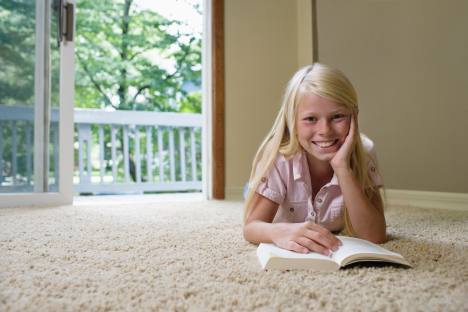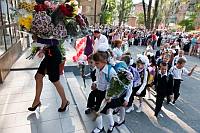Mum’s the word for tip-top tuition

Smiles better: learning at home can be very effective. Source: Alamy / Legion Media
Seven-year-old Alisa Chupova begins her day at 9 am.
After breakfast, it’s time for writing: Alisa inscribes words in her copybook.
Her mother sits next to her and watches carefully to make sure she holds her
pencil correctly and that the letters are fine. After that comes reading.
Today, Alisa reads several pages from Vitaly Bianki’s Forest Newspaper . Then
it’s time for some exercise.
At about one o’clock, Alisa and her
mother, along with Alisa’s younger brother, go to the Zoological Museum
to see what those quails, partridges and hawks from Bianki’s tales look like.
There are few in the museum on weekdays, making it easy to conduct the nature
lesson.
Alisa is not being kept away from school because of any underlying health
problems; her mother simply opted to educate her at home. As in Britain, it is
entirely legal to do so.
The popularity of home education is growing in Russia. In just a few years, the
numbers have increased nearly tenfold from a mere 11,000 children in 2008 to
around 100,000 now. Estimates of the numbers of home-educated children in Britain vary, but it is thought to be roughly
50,000, while in the United
States, more than two million are taught at
home. US
research suggests that home education is one-and-a-half times more effective
than traditional schooling.
“At home, I can plan my child’s day in a way that is good for the family,” says
Alisa’s mother Ekaterina. “It makes more sense to go swimming in the morning
when there are few people in the pool; after that we can go home and do some
schooling. It’s also good to visit museums on weekdays when they are not
crowded and you can go and look at paintings and other exhibits in peace. With
the academic work, Alisa works at her own pace – there is no need to hurry.”
All children have to cover key subjects wherever their learning takes place.
But professional support is available from various institutes who offer remote
or online consultations and teaching courses for parents. “It is much more
difficult than just sending your child to school,” says Ekaterina. “It’s a big
responsibility. At school, we share that responsibility with teachers, or just
shrug it off completely.
“The main danger associated with home schooling is that children do not get
enough social skills,” warns Elena Kutepova, deputy director of the Institute
for Integrative (Inclusive) Education at the Moscow State University of
Psychology and Education. “Children going to conventional schools build
relationships with other children and adults – relationships that cannot be
built within just one family.”
Many British parents work in small groups with other home educators so that the children can socialise and the adults share the teaching; in Russia, home-schooled children rely more on clubs for their socialisation. Ms Kutepova says that although clubs can help children with social adaptation skills, it is only at school that they develop a sense of responsibility.
First published in Rossiyskaya Gazeta.
All rights reserved by Rossiyskaya Gazeta.
Subscribe
to our newsletter!
Get the week's best stories straight to your inbox
